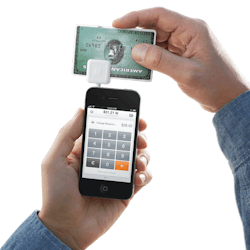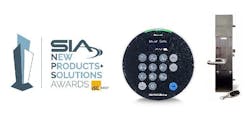Nearly one in three consumer purchases in the United States is made with a credit card. As a result, many customers assume that every business accepts credit or debit cards. For a mobile locksmith or a locksmith at a jobsite, accepting credit cards has become a necessity, as more and more people do not carry cash or a checkbook. With the introduction of the smart phone and Internet capable tablets, the process of accepting a credit card has become totally mobile and a whole lot easier.
"Smart phones are widely expected to have a significant impact on the electronic payment industry because they fill an immediate and strong need to move everyday transactions from cumbersome cash to cards and other forms of electronic payments," according to MasterCard.
A growing number of mobile payment system companies offer credit card processing apps for Android (running OS 2.2 or higher) and iPhone (running iOS 5.0 or higher) smart phones, iPod Touch and many tablets. This has made the process easier and less expensive. A limited number of these companies currently support BlackBerry devices. Contact your cellular phone carrier to be certain your smart phone or tablet is compatible before beginning the process.
This growth was spurred by the development of the mobile device reader and its ability to connect to the Internet. However, with this relatively new technology, there are security concerns. Point of sale mobile payment acceptance brings new risks to the security of cardholders' data.
The PCI (Payment Card Industry) Council's five founding global payment brands, American Express, Discover Financial Services, JCB International, MasterCard Worldwide, and Visa Inc., have agreed to incorporate the PCI Data Security Standard (DSS) as the technical requirements of each of their data security compliance programs. With Mobile Point OF Sale (MPOS) it is important to secure the account data at the point of capture. For a list of validated Point-to-Point Encryption (P2PE) solutions, go to the PCI Council Web Site: www.pcisecuritystandards.org.
To make the mobile device capable of online processing, a credit card reader plugs into your device’s standard 3.5mm headphone mini jack. Most mobile credit card readers are relatively small and will fit into a shirt pocket. Most mobile credit card processing readers are free; other providers require the reader to be purchased. Some providers will give a rebate equal to the purchase price when terms are fulfilled.
Reader software must have SSL (Secure Sockets Layer) Encryption, which are cryptographic protocols designed to provide communication security over the Internet. PCI Data Security Standards (PCI DSS) provide regulations that payment processing companies must follow.
There are two methods for processing a credit card: swiping the card through the reader and entering the credit card number using a keypad.
The advantage of having a reader is that swiping the credit card enables the entire process to be completed without the need of human interaction. Entering the credit card number can result in a significantly higher cost of doing business each time a credit card is processed in this method.
Mobile credit card processing begins with choosing an independent company that is not directly connected with any credit card. Visa and MasterCard do not offer processing services. Choosing a company is not easy. Just about every company has varying rates and services available.
When you begin the researching process, find out which credit cards are accepted by what companies. Not all companies accept Visa, Master Card, Discover and American Express. Some companies also process PayPal, checks, debit cards and email invoices.
The fee charged for processing a swiped card transaction can be different for different credit cards. Some processing companies charge additional fees for card swipes when swiping cards other than Visa, MasterCard or Discover. These can include American Express, rewards, corporate and/or special cards.
Depending upon the processing company and monthly sales totals, they offer pay-as-you-go plans and usually subscription (annual) plans. Some companies charge a start-up, statement, application, monthly minimum or customer service fees. Each time a credit card is swiped or keyed in, there will be either a fixed amount or a percentage fee charged. Although these fees are typically higher than what you’d pay using store-based processing methods, these newer services can provide small businesses a simple way to accept non-cash or check payments. And they eliminate the need and cost of chasing down customers who have written bad checks.
Important considerations are time required until the funds are accessible and having multiple user settings for all mobile employees.
Most mobile credit card processing companies offer additional benefits. These can include company logo and contact information on the emailed receipt, saving customer information, void, signature capture (using a touchscreen), refund/credit. Some companies offer live customer support, which can be advantageous when there is a problem trying to complete a sale.
As an example, Intuit GoPayment offers the ability to synchronize with QuickBooks and to geolocation sales tax. PayPal offers the ability to accept PayPal, checks and email invoices.
Before committing to one company, call the different companies that will probably meet your needs and discuss your exact needs. Low transaction fees aren’t important if the software and service does not work for your business.
Once you have chosen a company, you download their app and obtain their reader. Run your own credit card to test and become comfortable with the process. This can help you make sure the email and/or printed receipt will have the correct information and look professional. You will also see how the sales are tracked, where the money goes and the actual time required for payment. Some companies offer the ability to record customer contact information.
Important: No credit card information is stored in the mobile device or the reader.
In the United States, contactless payments will eventually be available via a Near Field Communications (NFC) antenna within smart phones and Internet capable tablets. When contactless payments are viable, credit card companies will have integrated contactless solution for making payments directly to a mobile device.
Mobile Point-Of-Sale solutions (MPOS) are available from credit card companies. MasterCard has best practice for MPOS acceptance. This guide is an effort to facilitate the growth of mobile point of sale acceptance. Recommendations will provide the consumer payment experience to be safe and consistent with brick and mortar stores. This best practice promotes the integrity of MasterCard payments by maintaining the confidentiality of the cardholder credentials and building trust.
Having the capability to complete sales using credit cards, etc., can help your company increase sales by not limiting your payments to only cash or check.
A large number of mobile payment systems are available. I have included a partial list of companies that provide a variety of services and accept different ways to pay. For more information, see the following alphabetical list:
Chase Paymentech: www.chasepaymentech.com
Commerce Payment Systems: www.commercepaymentsystems.com
Flagship ROAMpay Merchant Services: www.flagshipmobilemerchant.com
Intuit GoPayment: www.intuit-gopayment.com
Merchant Anywhere: www.merchantanywhere.com
PayPal: www.paypal.com/webapps/mpp/credit-card-reader
Square: squareup.com






